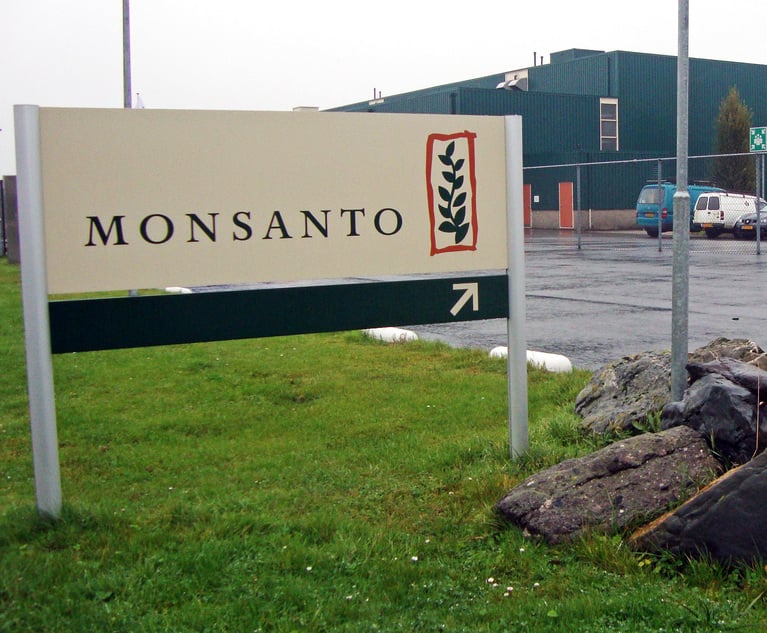From Cans to Labels: Effects of Government Activity on the Craft Beer Industry
Resiliency and innovation are hallmarks of the craft brewing industry. From experimenting with new ingredients to finding ways to survive in the face of prohibition, developing creative solutions to challenges is something we've come to expect from our favorite craft brewers.
February 23, 2019 at 12:46 PM
6 minute read
 Kathleen Kline of Greenberg Traurig
Kathleen Kline of Greenberg TraurigResiliency and innovation are hallmarks of the craft brewing industry. From experimenting with new ingredients to finding ways to survive in the face of prohibition, developing creative solutions to challenges is something we've come to expect from our favorite craft brewers. 2018 tested that resiliency, both politically and economically. Trade policy has created a shifting playing field, with tariffs threatened and enacted, and trade agreements proposed and dismantled. 2018 ended, and this year began, amidst the longest federal government shutdown in history. These unique conditions have affected—and continue to affect—most industries, and the craft beer industry is no exception. As part of an already constantly changing industry, breweries offer an informative glimpse into possible developments we might see in coming years.
Trade Policy
Changes in trade policy can have major impacts on the craft beer industry, and over the past year, they have. The 2018 tariffs the United States levied on steel and aluminum imports are a prime example—most beer is brewed in elaborate stainless steel setups, and aluminum cans have surpassed glass bottles and continue to increase in market share as retail beer vessels. The Brewers Association, a trade association for small and independent craft brewers, has expressed concern about these tariffs, citing the disproportionate effect on smaller breweries as compared to larger, more established ones. Because the steel and aluminum tariffs affect, respectively, the cost and availability of materials for producing and for distributing beer, they likely serve as a barrier to both the creation and expansion of independent breweries. At the other end of the size spectrum, multinational beverage companies have also expressed concerns that tariffs on aluminum could curtail growth and investment in product, as more operating funds will necessarily be diverted to packaging. The tariffs' long-term effects remain to be seen, but breweries and many other businesses anticipate raising prices, slowing hiring, or both, in reaction to the increased cost of necessary raw materials.
Government Shutdown
The government shutdown has also hampered the growth of craft and micro-breweries. During the shutdown, the federal Alcohol and Tobacco Tax and Trade Bureau (TTB) suspended operations. This entity is responsible for approving the contents of labels for new beer releases, which must include the disclosure of certain ingredients such as colors and sweeteners, a health warning statement for beverages with .5 percent alcohol by volume or greater, and the specific alcohol content, if required by state law. Approval of new labels halted during suspension of TTB operations, meaning new or pending applications were not reviewed and a backlog developed. Because of the varying timeline from concept development through brewing and packaging to distribution, this interruption in what most consider a routine application and approval process will likely mean that some seasonal and other limited-release beers will never reach the shelves. Breweries must leave partially to chance whether the labels for their new Maibock will be approved in time for a spring release, and whether the backlog will be alleviated by the time their fruity wheat or refreshing gose is ready to hit the summer shelves. These delays and cancellations of releases will have a negative impact on breweries' profitability, particularly breweries that rely on rotating releases rather than—or more heavily than—on flagships, and may jeopardize the viability of fledgling would-be startups.
The Small Business Administration (SBA) stopped processing loan applications during the shutdown, delaying, sometimes indefinitely, the inception of many startups including breweries. Aside from this obvious short-term effect, the temporary unavailability of small business loans may have longer-reaching consequences. Loans from the SBA have long been considered reliable, and government funding stable. However, in light of the recently ended shutdown and the uncertainty of future uninterrupted government operation, borrowers both in the brewing industry and more broadly may turn to alternative, private-sector sources of funding. Hesitancy to rely on SBA loans could lead to an increase in reliance on private-sector funding, and the development of new private-sector funding sources. Indeed, breweries have long embraced the employee-ownership model, and many are now turning to crowdfunding as a method for recruiting investors to buy into the company in exchange for start-up cash.
The Farm Bill
While 2018 certainly contained a few setbacks for breweries, particularly smaller, less-established breweries, the long-awaited Farm Bill—signed into law near the end of December— offers some significant opportunities for growth in the industry. Key provisions of the Agriculture Improvement Act of 2018 promise safeguards for domestic cultivation of hops and barley, two primary ingredients of beer. The final version of the act reflected the “Hop Plant Health Initiative,” which provides for high priority research into diseases affecting hops in the United States. The act similarly promises research into diseases and other afflictions affecting barley. In addition, the act contemplates expanding crop insurance to cover both hops and malting barley. These provisions, particularly in conjunction with each other, should stabilize hops and barley as viable domestic crops. The exact effects of the Farm Bill on the brewing industry are uncertain, but increased availability of these domestically grown raw ingredients will likely represent increased opportunity, particularly if trade relations and import barriers remain uncertain. These benefits may be felt more strongly by smaller, and newer, breweries who either have the flexibility to experiment in small batches with crops from untried sources, or who have yet to enter into supply contracts from established producers.
Looking Ahead
Craft beer has continued to evolve and flourish in this changing climate. Brewers adapt in response to the issues they encounter—some startups have turned to crowd-funding, while other breweries focus on hyper-local distribution to limit expenditures on aluminum cans and to avoid federal requirements triggered by out-of-state shipment. The new year will likely pose new challenges, but new examples of resilience and innovation are sure to emerge.
Kathleen Kline is a litigator, focusing on complex matters including environmental litigation, securities and derivative actions, financial services litigation, and professional liability. She also serves as Legal Adviser to the Philadelphia Homebrew Club.
This content has been archived. It is available through our partners, LexisNexis® and Bloomberg Law.
To view this content, please continue to their sites.
Not a Lexis Subscriber?
Subscribe Now
Not a Bloomberg Law Subscriber?
Subscribe Now
NOT FOR REPRINT
© 2025 ALM Global, LLC, All Rights Reserved. Request academic re-use from www.copyright.com. All other uses, submit a request to [email protected]. For more information visit Asset & Logo Licensing.
You Might Like
View All

'Close Our Borders?' Senate Judiciary Committee Examines Economics, Legal Predicate for Mass Deportation Proposal
3 minute read
'Serious Misconduct' From Monsanto Lawyer Prompts Mistrial in Chicago Roundup Case
3 minute read
Monsanto Scores 2nd Phila. Roundup Verdict, but Fails to Stop Impending Trial
3 minute readTrending Stories
- 1'It's Not Going to Be Pretty': PayPal, Capital One Face Novel Class Actions Over 'Poaching' Commissions Owed Influencers
- 211th Circuit Rejects Trump's Emergency Request as DOJ Prepares to Release Special Counsel's Final Report
- 3Supreme Court Takes Up Challenge to ACA Task Force
- 4'Tragedy of Unspeakable Proportions:' Could Edison, DWP, Face Lawsuits Over LA Wildfires?
- 5Meta Pulls Plug on DEI Programs
Who Got The Work
Michael G. Bongiorno, Andrew Scott Dulberg and Elizabeth E. Driscoll from Wilmer Cutler Pickering Hale and Dorr have stepped in to represent Symbotic Inc., an A.I.-enabled technology platform that focuses on increasing supply chain efficiency, and other defendants in a pending shareholder derivative lawsuit. The case, filed Oct. 2 in Massachusetts District Court by the Brown Law Firm on behalf of Stephen Austen, accuses certain officers and directors of misleading investors in regard to Symbotic's potential for margin growth by failing to disclose that the company was not equipped to timely deploy its systems or manage expenses through project delays. The case, assigned to U.S. District Judge Nathaniel M. Gorton, is 1:24-cv-12522, Austen v. Cohen et al.
Who Got The Work
Edmund Polubinski and Marie Killmond of Davis Polk & Wardwell have entered appearances for data platform software development company MongoDB and other defendants in a pending shareholder derivative lawsuit. The action, filed Oct. 7 in New York Southern District Court by the Brown Law Firm, accuses the company's directors and/or officers of falsely expressing confidence in the company’s restructuring of its sales incentive plan and downplaying the severity of decreases in its upfront commitments. The case is 1:24-cv-07594, Roy v. Ittycheria et al.
Who Got The Work
Amy O. Bruchs and Kurt F. Ellison of Michael Best & Friedrich have entered appearances for Epic Systems Corp. in a pending employment discrimination lawsuit. The suit was filed Sept. 7 in Wisconsin Western District Court by Levine Eisberner LLC and Siri & Glimstad on behalf of a project manager who claims that he was wrongfully terminated after applying for a religious exemption to the defendant's COVID-19 vaccine mandate. The case, assigned to U.S. Magistrate Judge Anita Marie Boor, is 3:24-cv-00630, Secker, Nathan v. Epic Systems Corporation.
Who Got The Work
David X. Sullivan, Thomas J. Finn and Gregory A. Hall from McCarter & English have entered appearances for Sunrun Installation Services in a pending civil rights lawsuit. The complaint was filed Sept. 4 in Connecticut District Court by attorney Robert M. Berke on behalf of former employee George Edward Steins, who was arrested and charged with employing an unregistered home improvement salesperson. The complaint alleges that had Sunrun informed the Connecticut Department of Consumer Protection that the plaintiff's employment had ended in 2017 and that he no longer held Sunrun's home improvement contractor license, he would not have been hit with charges, which were dismissed in May 2024. The case, assigned to U.S. District Judge Jeffrey A. Meyer, is 3:24-cv-01423, Steins v. Sunrun, Inc. et al.
Who Got The Work
Greenberg Traurig shareholder Joshua L. Raskin has entered an appearance for boohoo.com UK Ltd. in a pending patent infringement lawsuit. The suit, filed Sept. 3 in Texas Eastern District Court by Rozier Hardt McDonough on behalf of Alto Dynamics, asserts five patents related to an online shopping platform. The case, assigned to U.S. District Judge Rodney Gilstrap, is 2:24-cv-00719, Alto Dynamics, LLC v. boohoo.com UK Limited.
Featured Firms
Law Offices of Gary Martin Hays & Associates, P.C.
(470) 294-1674
Law Offices of Mark E. Salomone
(857) 444-6468
Smith & Hassler
(713) 739-1250





